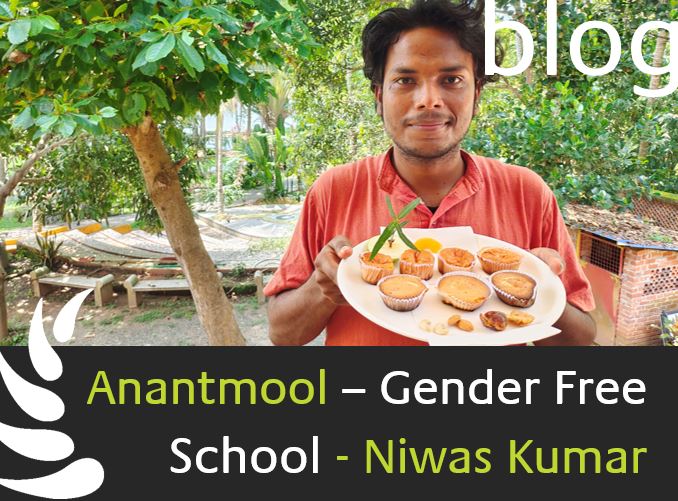Niwas Kumar is from Bihar in the north of India, and he is focused on a rather sensitive topic that is right in the heart of Indian culture, which is very much characterized by gender norms. From early childhood onwards, every aspect of daily activities is clearly defined to girls or boys, men or women. What to play and with whom, where to sit in buses or canteens, and what professions to enrol in, is strictly defined. children face discrimination in schools if they are non-conforming. Niwas is asking, why is gender so important in the education of a child? With his organisation Anantmool, he wants to start a gender free learning centre. He believes that anyone can learn anything if social and practical barriers don’t exist.
Anantmool | Spread your roots
Connecting the dots
At the age of 4, when children play with toys, go to school, and get pampered by their families, I was taken along to a micro-business training by my mother. In my village, we had a single-teacher school, where the teacher was hardly visible. My primary schooling happened while travelling with my mother. We shifted from village to town for good education, to no avail.
My mother is an activist, fighting against corruption. Thus, my family was threatened, and my parents lost their jobs. My siblings and I left school. At that time, I was just 12 years old.
I had to engage in child labour to meet my education expenses. During this time, I met a person who wanted to help me do business. But I refused because I wanted to study. Under his guidance, I joined an organization called i-Saksham where I worked 18 hours a day and learned all the advanced skills to manage and lead the work quickly. Meanwhile, I did my undergraduate degree from an open university. Keen to explore more, I participated in Jagriti Yatra (the world’s longest entrepreneurship train journey) and got an opportunity to create rural entrepreneurs at ‘Project Potential’.
From age 17 to 21, I trained 150 tutors in teacher training, 200 students in computer training and got 23 entrepreneurs incubated. This journey helped me realize the importance of open learning in alternative ways.
In 2019, while doing my Master’s, I read about gender disparity and understood how women faced gender-based issues. While travelling on a train, I met a trans woman looking quite chic in black jeans and a T-shirt, but she was begging for money. I stopped her and asked, “Why are you begging for money? Why don’t you have a regular job?” She said, “Who will give me a job? Will you?” I was silent. “What do you do?” she asked. I said, “I am going to Uttarakhand for research work”. “Okay, so why don’t you do your research on me? Find out, why God made me like this? If God made me like this, then why do people not accept me as I am?” And she left.
Back then, I didn’t know what to say. Something happened inside me and reminded me of an incident from my childhood, when I was 7 years old. My mother had covered my eyes on a train when a trans woman came by. My mother said that this woman was not a woman, that he was wearing a saree just to beg for money.
I started reading about transgender people and came to know that the transgender community is the most affected marginalized group in India when it comes to gender based discrimination.
Further research revealed that it is one of the most neglected communities with no access to any public service. So, I formed a group of five college mates and started doing exhibitions to make people aware about gender diversity. One day, one of our group members got a call from a 17-year-old trans girl from Delhi. She said that she is getting harassed and raped by her family because of her cross identity. Can you help me?”
We were ready to rescue her, everything was planned and the day when it would happen, she left home early morning, and after five minutes, she texted us, she had been caught by her family. From December 2019, we haven’t found her. She disappeared.
That was the main turning point in my life. I decided not to do any other job, but focus on creating a space where children can live free from any gender norms. After reading more and talking with many trans people, I came to understand that we needed to provide education in a gender free space so that those who experience gender dysphoria will be empowered to integrate themselves in society.
Niwas will present his kanthari TALK on Friday 17th December 2021 at Time: 17:10 IST. You can get more info and see the kanthari TALKS at http://www.kantharitalks.org/



